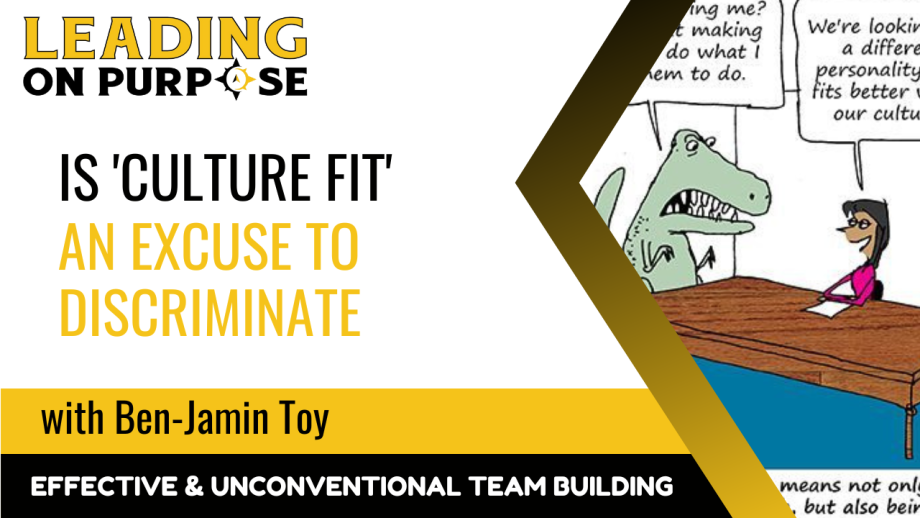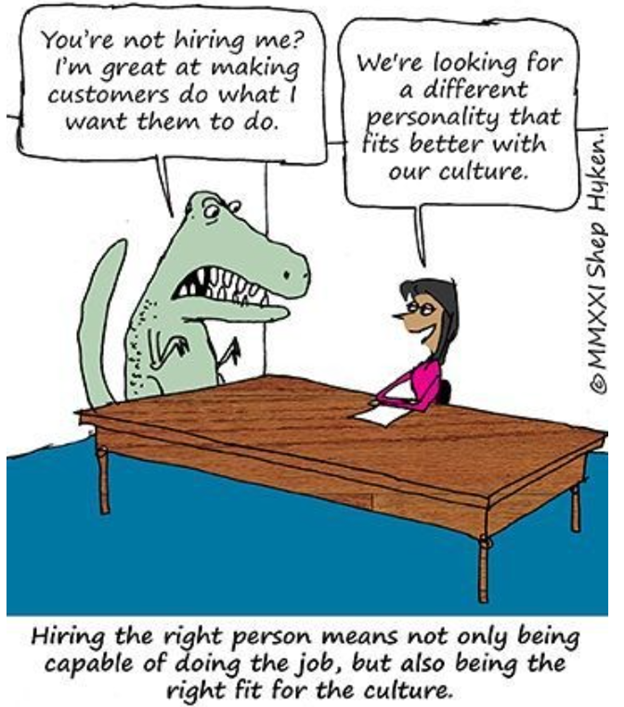
Is 'Culture Fit' an Excuse to Discriminate?
We recently shared a post that stirred up quite a bit of controversy all based on this comic we found online:

Today, we want to highlight some of the thought-provoking comments we received from our insightful LinkedIn community.
The original post was actually directed to job searchers. We encouraged them to seek out positions where they are a culture fit.
"If you want to go to work, get the job done and go home, you don't want a job at an organization that has daily meetings or there's an unwritten rule that employees get together after work for a drink once a week.
If you prioritize work/life balance/integration, you don't want the job where managers expect you to be available 24/7 or come in on weekends.
If you are an introvert, you don't want the job where leaders expect you to speak up in meetings if you want any shot at a bonus or promotion.
Keep searching until you find the organization where you're a culture fit.
It's the key to finding your workplace home and staying somewhere for a long, long time."
'Culture Fit' Used to Discriminate
What we discovered after sharing this post in some LinkedIn groups is that many people view 'culture fit' as a tool for discrimination. We heard from an individual who was told this excuse and felt they were being discriminated against based on their age:
"Except I have seen (and personally experienced) 'you don’t fit our culture' to mean you are too old to work here."
One user emphasized the importance of recognizing that individuals bring their own unique cultural backgrounds to any organization. They emphasized that it takes time for someone to assimilate and adapt to a new culture, and rejecting candidates based on immediate cultural compatibility can be unfair and biased.
Another astute commenter raised the question of diversity and inclusion. They rightly pointed out that if organizations only seek individuals who fit a particular mold, it hinders diversity and prevents the benefits that come from a wide range of perspectives and experiences. Embracing diversity, rather than seeking uniformity, fosters innovation, creativity, and a more inclusive work environment.
"Something shared with me a few years ago that stuck was the idea of being a 'culture add' not a 'culture fit'. The right company will see your diversity as a value add, not a distraction to the norm."
Another individual shed light on the potential drawbacks of using 'not the right fit' as a reason to reject candidates. They pointed out that this vague term can be used as a cover for unconscious biases and discrimination based on physical attributes, race, gender, religion, and more. This observation highlights the need for transparent and fair hiring practices to prevent the loss of valuable candidates due to biased gatekeepers.
"Recently I learned through DE&I education that it is helpful to change our language and thinking to the right addition versus fit. Using fit keeps us in the status quo whereas addition helps us think beyond status quo. Fit brings into play unconscious bias."
Does 'Culture Fit' Still Have Merit?
Going back to original comic shared, the crocodile says he manipulates clients/people. That is a behavior trait that would not align with core values. When did the argument become about appearance rather than personality and values?
When culture and core values are behavior based would you want to hire someone clearly not a fit? Bad fits are like cancers.
It's also interesting that just because others used that expression before that it doesn't mean something entirely different here.
We asked Dr. Troy for his take on the topic. See below:
"My advice to leaders … don’t spend a lot of time trying to make people happy or satisfied. It’s exhausting. Instead, hire people who fit the culture and go out of your way to create a sense of belonging, meaningful work, and opportunities for collaboration and team success with and for them."
Diversity and inclusion matter. Bringing in people from diverse backgrounds generates greater and more innovative ideas. Training leaders, managers and human resource personnel to create inclusive and diverse environments in the office should be a top priority in all organizations.
When building your diverse and cohesive team, you'll notice certain personality types who don't fit well in the group. Arrogance is a common trait that doesn't bode well for teamwork. If your organization is searching for a new hire and the team specifically asks the employee interviewing potential hires to be on the lookout for conceit, it seems like a smart move to hire the humble qualified individual over the arrogant one.
Culture fit should never be an excuse for discrimination. It should be used if a potential hire comes across arrogant and conceited during an interview. They have all the experience and qualifications to do the job, but the interviewer knows the current team works cohesively together and this potential hire would not be a good fit.
In the comic, the croc said, "I'm great at making customers do what I want them to do."
Perhaps the recruiter picked up on an arrogant attitude that they didn't feel would work well in the current team environment where collaboration is needed.
Perhaps the organization doesn't want an employee who will just make the customer do what they want but will be empathetic, understanding and communicative with customers which is more inline with their company values.
We appreciate the diverse perspectives shared by the LinkedIn community.
Thank you to those who are part of our LinkedIn network, and we look forward to engaging with you in future conversations.









